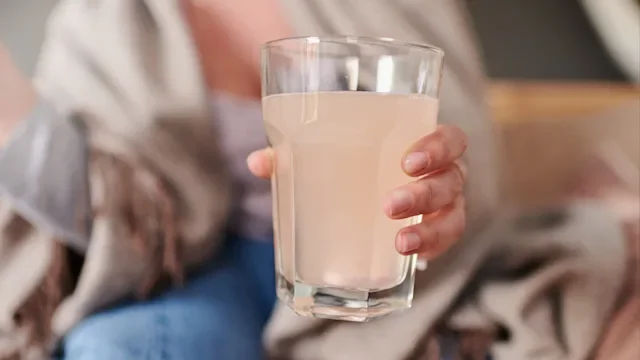Key takeaways:
You don’t always need cough medicine to ease a cough. Natural ingredients can help too.
Experts don’t recommend cough medicine for children younger than 4 years old. You can use natural ingredients to help instead.
Honey, lemon, agave nectar, and ginger may all help ease a child’s cough. But don’t give honey to children younger than 12 months old.
Did you know people spend an estimated $4 billion worldwide on cough medication each year?
That’s a lot of cough medicine. If your child has a cough from a cold, you may wonder if cough medication is the only option. But you might not need it. Most coughs go away on their own, and you can use natural ingredients to get relief.
Natural remedies are especially good for young children, since experts recommend against giving children younger than 4 years old cough medications. They also recommend speaking with a pediatrician before giving cough medicine to children between 4 and 7 years old.
Search and compare options
If your child’s struggling with a cough, here’s how to use natural ingredients to make homemade cough syrup for kids.
Can you make a natural cough suppressant at home?
Yes, you can make your own cough syrup at home. But there are no standard or expert-advised recipes for making your own homemade cough syrup.
An ideal cough syrup would soothe your throat, ease pain, and moisten your throat and upper airways. This helps reduce the cough reflex. You also want a natural cough syrup to be sweet and slightly thick. These properties prompt your body to make more saliva, which also helps keep your throat moist.
Here are four ingredients that work well together to make a natural cough suppressant syrup:
Fresh lemon juice
Honey
Agave nectar
Ginger
We’ll go over each ingredient in detail later, but one way to combine all four is with this homemade cough syrup recipe:
Combine the zest of 2 lemons, ¼ cup peeled ginger (or ½ tsp of ground ginger), and 1 cup of water in a small saucepan.
Bring the mixture to boil, then lower the heat and let it simmer for 5 minutes.
Strain the mixture into a heat-proof measuring cup.
Rinse the saucepan and add 1 cup of honey or agave nectar. Warm gently, but don’t boil.
Add the strained lemon-ginger water and ½ cup lemon juice.
Stir the mixture until it forms into a thick syrup.
Pour it into a clean jar with a lid. Let it cool, then store in the refrigerator.
Eating for recovery: Here are the best foods to give your child when they have a cold (and a few to avoid).
Looking for more cold remedies? Here are nine natural remedies that can help your child feel better during a cold.
Flu in kids: Here are the most common flu symptoms in kids and when it’s time to seek care for their symptoms.
You can give your child 1 tsp to 2 tsp every 2 to 4 hours as needed for their cough.
Now that you’ve got the recipe, let’s take a closer look at each ingredient. We’ll see how they work and learn other ways you can use them.
1. Freshly squeezed lemon juice
Lemon is a common ingredient for natural cough and cold remedies. Freshly squeezed lemon juice can be safely given to babies older than 3 months old and children of all ages.
Read more like this
Explore these related articles, suggested for readers like you.
You don’t need much lemon juice to soothe a cough or sore throat. A teaspoon or two at a time is enough. Most children won’t drink straight lemon juice because of its sour taste.
That’s why it works best when mixed with something else, like the homemade syrup above. You can also add lemon juice to warm fluids. Giving your child warm fluids can help thin mucus, relax airways, and keep them hydrated. The vapors act as a mini humidifier.
Try adding 2 tsp of lemon juice to tea, warm water, or even warm apple juice. There’s no strict limit on how often you can give lemon juice (or fluids containing it), but it’s probably best to limit it to four times a day or less. Too much acidic juice may upset your child’s stomach.
To make the drink easier for your child to enjoy, you can add sugar. If your child is over 12 months old, you can use honey to sweeten tea or other warm drinks.
2. Honey
Honey is nature’s cough remedy. Strong evidence shows that honey can ease coughs and works better than over-the-counter (OTC) cough medicines, especially for kids. Honey also contains antioxidants, which can help lower inflammation in your throat. Its thick texture coats the back of your throat, easing the cough reflex.
You can give your child 1 tsp to 2 tsp of honey as needed to ease their cough. In studies, 1 tsp of honey helped children sleep better at night when they had a cough.
You can also add honey to warm fluids or tea to give your child the added benefit of extra hydration.
Keep in mind, honey isn’t safe for babies younger than 1 year old. Giving honey to a baby can lead to botulism, a serious and sometimes deadly infection.
3. Agave nectar
Agave syrup comes from the sap of the agave plant. It contains minerals, vitamins, and polyphenols, which are antioxidants.
Agave nectar is similar to honey in several ways. Both are thick, sweet, and contain antioxidants, so they may ease coughs in similar ways. But there’s less evidence supporting agave nectar compared with honey. That’s why most experts recommend honey for kids when possible.
Unlike honey, pasteurized agave nectar isn’t linked to botulism illness. So, it may be a safe substitute for children between 3 and 12 months old. It’s still a good idea to check with your child’s pediatrician before giving agave to your baby.
4. Ginger
Ginger root is a spice with medicinal benefits used by many cultures. Ginger has anti-inflammatory properties, which may ease inflammation from colds. You can add ginger, along with lemon and honey (or agave), to warm fluids to help a cough. You can also use it in the homemade cough syrup described above.
Ginger has a very strong taste, so children usually won’t eat it plain. You can use either fresh ginger or powdered ginger as a cough aid. You only need a small amount of either. For a cup of warm fluids, add ⅛ tsp of powdered ginger or ½ tsp of fresh, peeled, grated ginger.
Frequently asked questions
You shouldn’t give children cough syrup that contains whiskey or bourbon. No amount of alcohol is safe for kids. Even small amounts can make young children and babies intoxicated and may affect brain development. It’s safer to use natural remedies like lemon water, warm fluids, and pasteurized agave nectar. Honey is also safe for children over 1 year old.
There is no “best” OTC cough medicine for kids. Experts recommend not giving cough medicine to kids under 4 years old. For older children, consider treating symptoms with natural remedies like honey, warm fluids, and humidifiers. Pain and fever relievers, like acetaminophen and ibuprofen, can also help ease other cold symptoms.
Seek medical care if your child has any trouble breathing, is breathing rapidly, or can’t eat or drink because of their cough. You should also seek care if your child is more sleepy or tired than usual, or has a high fever. If your child has a history of heart or lung problems, including asthma, it’s best to seek care as soon as they get sick.
You shouldn’t give children cough syrup that contains whiskey or bourbon. No amount of alcohol is safe for kids. Even small amounts can make young children and babies intoxicated and may affect brain development. It’s safer to use natural remedies like lemon water, warm fluids, and pasteurized agave nectar. Honey is also safe for children over 1 year old.
There is no “best” OTC cough medicine for kids. Experts recommend not giving cough medicine to kids under 4 years old. For older children, consider treating symptoms with natural remedies like honey, warm fluids, and humidifiers. Pain and fever relievers, like acetaminophen and ibuprofen, can also help ease other cold symptoms.
Seek medical care if your child has any trouble breathing, is breathing rapidly, or can’t eat or drink because of their cough. You should also seek care if your child is more sleepy or tired than usual, or has a high fever. If your child has a history of heart or lung problems, including asthma, it’s best to seek care as soon as they get sick.
The bottom line
Most coughs will go away on their own. While some OTC medications can help soothe a cough, you can also try natural cough remedies. Lemon, ginger, honey, and agave can all help soothe a cough. You can use them alone or together to ease your child’s cough. Experts recommend avoiding OTC cough medications in children younger than 4 years old. A homemade cough syrup made with lemon, ginger, honey, and water can be a safe substitute for children over 12 months old.

Why trust our experts?


References
Abuelgasim, H., et al. (2021). Effectiveness of honey for symptomatic relief in upper respiratory tract infections: A systematic review and meta-analysis. BMJ Evidence-Based Medicine.
Cohen, H. A., et al. (2012). Effect of honey on nocturnal cough and sleep quality: A double-blind, randomized, placebo-controlled study. Pediatrics.
Mashhadi, N. S., et al. (2013). Anti-oxidative and anti-inflammatory effects of ginger in health and physical activity: Review of current evidence. International Journal of Preventive Medicine.
Murgia, V., et al. (2020). Upper respiratory tract infection-associated acute cough and the urge to cough: New insights for clinical practice. Pediatric Allergy, Immunology, and Pulmonology.
National Honey Board. (n.d.). Honey cough syrup.
Nationwide Children’s Hospital. (2022). Cough and cold medicines.
Oduwole, O., et al. (2018). Honey for acute cough in children. Cochrane Database of Systematic Reviews.
Paul, I. M., et al (2014). Placebo effect in the treatment of acute cough in infants and toddlers: A randomized clinical trial. JAMA Pediatrics.

















